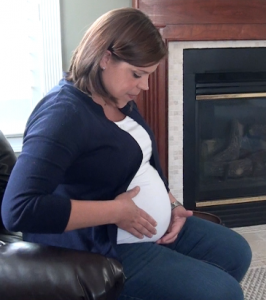
Jennifer Walker, LCSW, PMH-C, Maternal Mental Health Specialist weighs in on some answers to our most asked questions when it comes to emotional wellness for parents!
Q and A on mental health for mommy and daddy:
What is perinatal depression?
There are several terms you might see for mental health conditions that mothers can experience during pregnancy or after having a baby. Some of them are:
postpartum depression (or just “postpartum” sometimes) – this is the term for  depression happening in the first year AFTER having a baby
depression happening in the first year AFTER having a baby
perinatal depression – “peri” means “around” so this term means the depression that happens AROUND having a baby. It can be during pregnancy or within the first year after having a baby.
Maternal depression – this term could mean either of the two terms above
Perinatal Mood and Anxiety Disorders (PMADS) – this is a term that includes all of the possible mood disorders that can occur before or after having a baby. These include Depression, Bipolar mood disorders, Anxiety, Obsessive Compulsive Disorder, Post Traumatic Stress Disorder, and Postpartum psychosis.
How do you know the difference between Baby Blues and true postpartum depression?
Baby blues only last the first few weeks after having the baby. If your symptoms go on past those first few weeks, it is very important to go to your health care provider to see what is going on.
How long does postpartum depression last?
This really depends on the person. Postpartum depression is considered a temporary and very treatable medical condition. If you are identifying it and getting help, then you are on the right path. The earlier that depression is identified and treated, the sooner you will get relief from the symptoms and get back to focusing on what is important to you.
How does postpartum depression affect the bond between mom and baby?
Depression can really drain the energy out of a parent and make it harder for the parent to focus on the baby, like smiling at the baby or tuning in to baby’s cues. Depression can sometimes get in the way of the parent feeling that close emotional connection to the baby that they hoped for. Sometimes parents feel really guilty about this, which can make them feel even worse than they already do. Even if parents don’t feel their best, it’s important for them to still smile and talk to the baby. This helps the baby’s development. Bonding doesn’t always happen right away, even for people without depression. With time and intention, that bond can grow.
Can dads get postpartum depression?
Yes. Dads have some of the same risk factors for depression as moms. If a dad has symptoms of depression, it is important that he go to his healthcare provider to see what’s going on.
What should you do if you think that you or your partner is experiencing postpartum depression?
You could try saying something like “I see you are really struggling and I’m concerned about you. Depression is the most common medical complication of childbirth. I am wondering if this is what’s going on. Would it be ok if we call our medical provider to see what’s going on?”
What if my partner is talking about ending her life, hurting the baby or someone else?
Go to the emergency room or call the suicide hotline. Do not wait. This is a medical crisis.
What if my partner is not making sense, like she seems delusional or is hallucinating?
Go to the emergency room or call 911. This could be postpartum psychosis, a rare but very serious medical condition. This is a medical crisis and needs immediate medical attention.
Can adoptive parents experience postpartum depression?
Yes, adoptive parents are at risk of developing depression as well.
Is there any way to avoid postpartum depression?
While you might not be able to completely avoid a postpartum mood disorder from developing, there are things you can do to avoid it from becoming a crisis. Here are some tips:
Know your risk. Here is a checklist of some risk factors:
- It’s hard for me to ask for help. I usually take care of myself.
- Before my periods, I usually get sad, angry, or very cranky.
- I’ve been depressed or anxious in the past.
- I was depressed or anxious when I was pregnant.
- My mother, sister, or aunt was depressed or very nervous after her baby was born.
- Sometimes I don’t need sleep, have lots of ideas, and it’s hard to slow down.
- My family is far away and I feel lonely. I don’t have many friends nearby that I can rely on.
- I wasn’t very happy about my pregnancy.
- I don’t have the money, food, or housing that I need.
If you answered yes to any of these risk factors, here are some ideas:
Ask your medical provider to be screened for postpartum mood disorders.
Get any support available to you. Look for programs in your community for new moms and enroll. Look for new mom support groups, especially ones for moms with anxiety and depression. Online support is available through Postpartum Support International
Find a therapist. Establish a relationship with a counselor before you really need it. Look for someone who specializes in maternal mental health. Postpartum Support International keeps a list of providers. You can also contact your insurance to find out where to go.
Take care of yourself – sleep when the baby sleeps, have someone watch the baby so you can sleep, drink water, eat healthy foods, get outside, take a walk
Get informed about perinatal mood and anxiety disorders. Postpartum Support International is a great resource.
Let someone in your support system know that you are concerned and ask them to watch for early signs and symptoms.
Be very kind to yourself and reach out for the help and support that you and your baby deserve.
Signs and Symptoms of Postpartum Depression
Did you know that one in seven women experience mood and anxiety disorders during pregnancy or in the first year after having a baby?
Signs and symptoms of Perinatal Mood and Anxiety Disorders (PMADS):
- Feeling depressed or void of feeling
- Feeling of hopelessness
- Lack of interest in the baby
- Trouble concentrating
- Brain feels foggy
- Feeling anxious of panicky
- Feeling angry or irritable
- Dizziness or heart palpitations
- Not able to sleep when baby sleeps
- Extreme worries or fears (including the health and safety of the baby)
- Flashbacks regarding the pregnancy or delivery
- Avoid things related to the delivery
- Scary and unwanted thoughts
- Feeling an urge to repeat certain behaviors to reduce anxiety
- Needing very little sleep while still functioning
- Feeling more energetic than usual
- Seeing images or hearing sounds that others cannot see/hear
- Thoughts of harming yourself or your baby
 You may be doubting your abilities to care for your baby or feeling guilty for not being good enough.
You may be doubting your abilities to care for your baby or feeling guilty for not being good enough.
A lack of engagement or disconnection from you and your baby may occur.
If you are experiencing such signs, know you are not alone and reach out to your medical provider and let them know you would like to be assessed for a Perinatal Mood and Anxiety Disorder. There is a great checklist here, to help you get a conversation going with your medical provider.
There is a great checklist here, to help you get a conversation going with your medical provider.
There is so much hope and support out there for parents with PMADs. Postpartum Support International has lots of information, support, and resources for how get help.
Resource for dads to help understand postpartum depression
If you feel like you are in crisis, Call or text 988
References:
CDC (2017, February). Depression among women. Retrieved from https://www.cdc.gov/reproductivehealth/depression/index.htm
Postpartum support International http://www.postpartum.net/get-help/get-help-overview/
New Parent Care Plan
Aimee Ketchum, OTD, OTR/L
As an occupational therapist, one of the most important parts of my job is writing care plans. Whenever I get a new patient, the first thing I do is observe and evaluate the patient, interview the patient and the family, learn what they can and cannot do, learn what is important to the patient and family, and ask them what their personal goals are. I then get to work creating a care plan. The care plan is a therapist’s guide to treatment. We take all of the information from the evaluation, everything the patient and family shares with us, and we put together a plan to support the patient and ensure that they meet the goals that are important to them. Sometimes I spend hours on a care plan. Then in the following weeks, I constantly re-evaluate it, tweak it, revise it, and assess our progress. Our goals are painfully measurable, right down to the details. If a child is developing their fine motor skills and the goal is to color in the lines, my goal might look something like this:
Child will hold a crayon with a three-finger-grasp to color within a 3″ by 3″ area 80% of the time.
It is very specific and very measurable so that I can assess the child’s progress every week and take note of improvements.
This made me think, what if new moms and dads were to invest this much time and energy into care plans for themselves? After all, new parents have just had a monumental change in their life and if anyone needs a lot of care, it is them.
Writing down goals is a great way to achieve them. Your goals may simply be to get rest while your baby rests or remember to eat a balanced meal at least once a day. Maybe you have a sore back from holding your baby all day and you would benefit from a few stretches in the morning. Putting these things in writing can really help you stick to a plan of care for you!
Your goal might look something like this:
I will stretch every morning for 10 minutes to until I am able to reach my toes and my back is no longer stiff.
Try to write down a few goals, then re-evaluate them every week. Are you able to work on your goals and make some progress?


